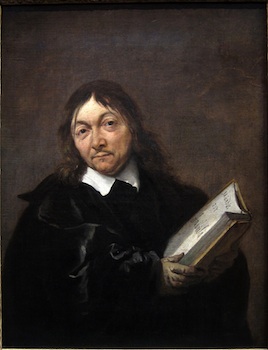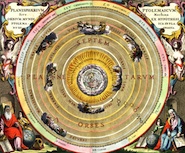SECTION II: What is the Self?
Reading 3: from Descartes's Meditations on First Philosophy
In this, the third reading on the topic of the human self, we see Descartes second Plato's notion that the mind (or soul) may well be immortal. Descartes's arguments are more rigorous, however - a reflection of the rise of the New Philosophy, or what we now know as "science". Descartes is part of the intellectual movement that replaces the Scholastic understanding of the material world with our modern, quantified understanding. Compare Galileo and Ptolemy, for some sense of the difference. |
|
"Nature teaches me by these sensations of pain, hunger, thirst, etc., that I am not only lodged in my body as a pilot in a vessel, but that I am besides so intimately conjoined, and as it were intermixed with it, that my mind and body compose a certain unity."
Could one think without a body? |
Rene Descartes, by Jan Baptist Weenix, c. 1647-1649. |
|
Ptolemy's world |
Galileo Galilei: "Of course, the Divine intellect knows infinitely more propositions than we do, since it knows all. Yet in respect of those few which the human intellect does understand, I believe its knowledge equals the Divine in objective certainty." |
Galileo's inclined plane |
Galileo, by Giuseppe Bezzuoli, from the Museum of Natural History, Florence (c. 1835) |
Go on to the next reading, Locke's Essay. |
|
Go back to Plato's Symposium. |
|





_crop_sm.jpeg)